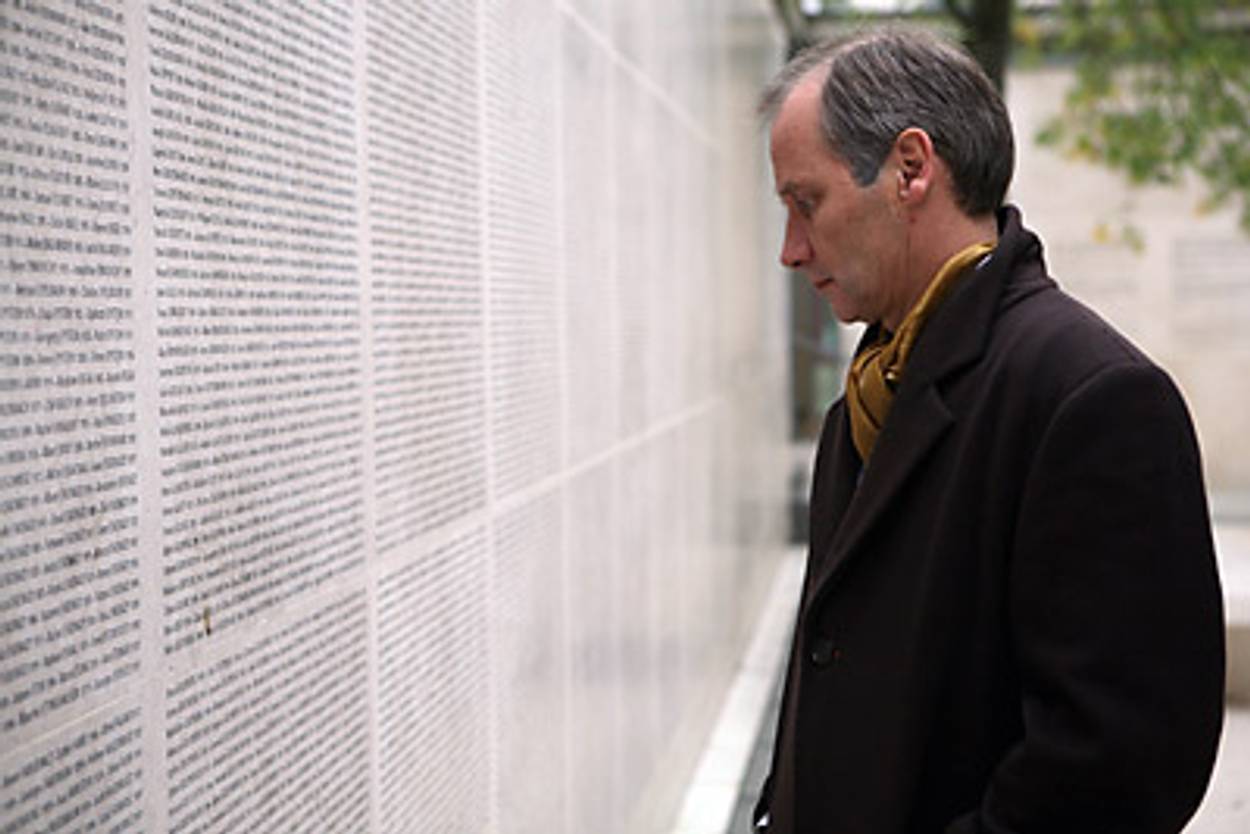Never, Ever Forget
In his latest movie, Amos Gitai restates the obvious




In film after film, Israeli director Amos Gitai takes on big ideas—persecution, history, discrimination, war. His latest venture, One Day You’ll Understand (opening today in New York City), is no different. Set in present-day France, the film opens with a shot of Victor (Hippolyte Girardot), a Catholic businessman, scanning names engraved on a wall at the Holocaust museum in Paris while the mournful notes of a clarinet undulate on the soundtrack. Soon it’s 1987 and Victor’s in his office, shuffling letters and documents related to his Jewish grandparents, the Gornicks—each of which he reads aloud, piecing together his family’s history for the viewer. But he’s distracted by a broadcast of the trial of Klaus Barbie, the Gestapo’s man in Lyon, and then he’s off to see his mother, Rivka (Jeanne Moreau), who dodges his inquiry about the fate of her parents during World War II.
Gitai takes his time. Dialogue about urgent matters is uttered without urgency; languorous scenes are constructed to communicate even the slightest bits of information (Rivka has dizzy spells; Chirac effectively took responsibility in 1995 for the deportation of France’s Jews; Jews traditionally place pebbles on headstones). And though Victor is rarely at rest, his nervous energy can’t propel the story forward. Despite jumps in time over the past seven decades, there’s little suspense. The film is also freighted with history. We all know the gist of what happened in France during the war years, and the depiction of Victor’s search for the truth about his family is not particularly revelatory or, dare I say, entertaining. It’s supposed to be a movie, after all, not a history lesson. But Gitai never passes up a chance to instruct.
Victor learns that his Catholic paternal grandparents moved into his Jewish grandparents’ apartment on the Rue de Paradis (!) after they went into hiding, and he’s tortured by it. It fuels his attempt to learn more about the Gornicks’ fate. When he shows his wife, Françoise (Emmanuelle Devos), the hotel room to which they fled and where they spent their last night together before their arrest, she tries to calm him, saying, “You can’t change history. You mustn’t forget, but you can’t undo what’s done.”
Sage counsel, that bit about “never forget.” Don’t they teach that in grade school these days?
But a single assertion of the mantra doesn’t satisfy Gitai. When Rivka, an assimilated, urbane woman of means, acknowledges her Jewish background for the first time in the movie, she does it at synagogue on Yom Kippur, with Victor’s adolescent children in tow. (Indeed, it’s a bit unclear if the kids previously knew of her Jewishness—yet how many Catholics are named Rivka?)
To the sound of the cantor’s operatic voice, Rivka pulls from a pocket her long-hidden yellow cloth star, Juif written on it, and asserts to her grandchildren, “Promise me you’ll never forget. Promise me you’ll resist intolerance. Promise me you’ll fight against discrimination.”
We promise, Madame Moreau!
In One Day You’ll Understand Gitai departs from the Israeli-Palestinian conflict, the subject of many of his recent films (including Disengagement and Free Zone), but he still maintains his self-imposed imperative to educate. He seems unaware that his films don’t typically show at multiplexes alongside High School Musical 3, where they’d be no less didactic but would be more likely to enlighten. They screen at festivals and in art houses where, presumably, his audience has some awareness of history and the horrors of the Holocaust. Gitai’s elementary approach to filmmaking suggests he never learned that other popular elementary school lesson: show, don’t tell.